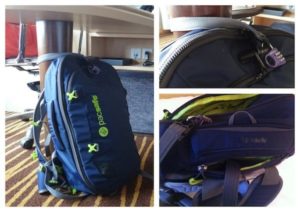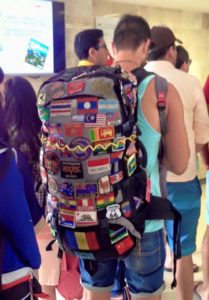Travel Advice
How to Stay Safe On The Road
Some of the most common questions I get about traveling are about safety and security on the road. Each country and culture is going to present its own challenges, the best thing you can do for yourself is to be a prepared and responsible traveller.
Through 5 years of traveling, I have never had anything directly stolen or been threatened, partly because I have developed a safety system and I stick to it (and a little luck). Stories of being robbed blind on a bus in Cambodia, mugged in Rio, drugged in Colombia, or pick-pocketed in Spain are rampant across the traveling world, these things do happen (though not as often as you think).
On Documents & Insurance:
Buy Travel Insurance
FIRST THINGS FIRST: Yes, you do need travel insurance
All it takes is one lousy driver, one running bull, one diving accident, one rock slip on a hike, one malarial mosquito, and then boom, you’re in the doc’s office needing treatment with a big bill to pay. This can happen anywhere, first or third world. Good thing for you however, you bought awesome travel insurance (hopefully), which these days only costs about $3 per day!
The best place to look for travel insurance is on Insure My Trip. The site makes it easy to compare multiple companies and plans based on what kind of insurance you are looking for. If you are planning on going diving, bungee jumping, or riding a scooter off into the jungle somewhere, consider getting the adventure sports packages.
Companies I would recommend:
- World Nomads,
- IMG Patriot International,
- Allianz,
- Travelex,
- Medex
- Medjet Assist
What to look for in a plan:
- Make sure your policy covers $100-300,000 (emergency)
- Make sure that your medical overage includes your hospital stay and will cover any preexisting conditions you might have
- Make sure it covers emergency evacuation.
- Make sure it provides coverage for all the countries you are visiting.
- 24hr Emergency Services and assistance.
- Coverage for lost stolen or damaged possessions.
- Cancellation Protection – transportation, hotel bookings, flights
- Family Emergency Coverage – flight home will be paid for.
- Personal Accident Coverage
- Coverage for Legal Expenses
Document Properly
It is also important to stay organized with your documents. I do this by keeping a folder with all my vaccination documents, identity prints, health reports and blood type, as well as emergency address for contacts, banks, and loved ones.
- Identity Prints: take all of you important identity cards and passport page, and photo copy them all on to one shit of paper. Including: student ID, Drivers License, Scuba License, ISIC Card, Passport page, and any important visa pages. Keep on folded within your passport pouch, one folded in your wallet, and a few in your folder. Try to use these prints as much as possible and do your best to avoid giving anyone your passport to hold (like a hotel/hostel front desk).
- Keep an lamented emergency contact card in your wallet with parents/guardians phone numbers, your blood type, home address, and any other relevant information.
- DOCUMENT YOUR POSSESSIONS: before you pack up everything to leave for your trip, take time to shoot a short video as well as still images of all your possessions, especially electronics. This will not only be useful for insurance purposes, but will also alleviate you from any accusations from customs officers trying to extract duty fees.
- Have your doctor print you out you vaccination history to keep. Use this as a record of all your vaccinations to show at visa entry points.
 On Carrying Your Valuables:
On Carrying Your Valuables:
Keep Your Passport Secure
Where to keep your passport has been in debate among traveller for decades. Some people love to have it on them at all times, some people are huge fans of leaving it in your bag or the hotel safe. I like to practice a little bit of both.
First off, you will need some sort of passport pouch, also know as money belts. They will go around your waste, around your thigh, or around your neck. Choose whichever is most comfortable for you, just make sure it’s not easy for thieves to spot or grab. I keep mine in a velcro pouch that I put in my front pocket and tie the lanyard to my belt loop. Works like a charm, and easy for me to access. Check out Lewis N Clark and Pac Safe accessories for the best ones.
Here are the rules for keeping your passport safe:
- Keep your passport on your person at all times when you are going through transit; whether it be through airports, on overnight buses, on flights, through border crossings, in taxi’s, or tuk-tuks, etc. First of all, you want to be able to access it easily in these situations since you will be needing it frequently. Secondly, you don’t want people going through your bags in cargo while you are sleeping, whether it be in the overhead compartment on a flight, or the bag under your feet, or the undercarriage of the bus. It’s always better to keep it on you as close as possible.
- Try to never leave your passport with anyone else, whether it be a hotel, Air bnb or hostel. Simply ask them why it is that they need it, talk to management, and ask them if a copy of your passport will suffice. This is where it comes in handy for you to hand over an expired 2nd passport, a secondary ID (drivers license, student id, ISIC card, etc), or your identity print (that has a copy of your passport and visas on it).
- Only leave your passport unattended if there is a safe in your room, or a legit locker in the hostel. By legit I mean metal, individual lockers, where a thief cannot simply break the lock connection, and the hostel/hotel management does not have a master lock/code. Otherwise, its better to have on your person, even when you are going out on a night on the town.
Keep Your Money Secure
The best way to keep your money secure on the road is using a money belt, neck pouch, or smart wallet. I personally love the smart-lock accessories from companies like Pacsafe, fully designed to keep the thieves out of you pockets and wallets.
- Pick something comfortable, and with easy access for yourself, but not flashy to others.
- Pick out a wallet with a lanyard that links to your belt-loop, that way pick-pockets wont be able to pull a fast one on you, like the Pacsafe Wallets ( This also comes in handy if you are too intoxicated to take care of your own things).
- Always have cash, but only carry the amount you need for that day, that way if something happens you don’t loose your entire week of funds.
- I personally like to carry my passport and money seperate, but its a good idea to find something that can fit both.
What to keep in your Money Belt or Passport Pouch:
- Passport
- Drivers License
- Primary Debit Card
- Primary Credit Card
- 100US Emergency-Cash
- Student ID and/or ISIC Card
- Ten Extra Passport Photos
- Laminated Emergency-Numbers Card
- Identity Print and/or Visa Copy
- Any needed medication or anti-viral pills
Locking Up Your Valuables
Invest in Proper Locks
Some people think this is isn’t very important, just go and buy any lock, blah blah blah. But I’ve never had anything stolen, and I truly think this is part of the reason. I have tried and tested an assortment of locks getting ready for my big trips, here are the best:
- For lockers & zippers you will need two types of locks, that will work interchangeably around the world. All hostels have different types of lockers or no lockers at all, each of which has a different sized hole.
- The most universal lock i’ve found is the Master Lock 4788D TSA Approved luggage lock. These will fit through every locker hole, saving you tons of money from buying and renting locks, and can also be used to lock up your backpack zippers while on the go. After 2 years and 50 countries, the original locks i’ve started with are still fully functional, but buy 4-5 of these as they get lost.
- Some hostels use the big metal baskets under beds for locks, and some have no lockers at all but allow you to padlock your room door (common case in India and Africa), for this situation you need a hefty padlock like the Master Lock 653D.
- When leaving your bags unattended in a hostel or guest room, use a bike cable lock to link your bags together to the bed or a desk in the room. No thief wants your dirty clothes, but they might want to take your nice bag! For this choose something like the Master Lock 8220D, something thick, and long enough to loop around several bags and around trees or tight places.
- This has come in handy on bus, trains and parks when you want to take a nap; and also beaches when you want to take a dip! Just lock your stuff up around the nearest tree and have peace of mind.

Quick Tips
- DEVELOP A THREE PAT SYSTEM for making sure you have everything you need. When I leave a cab, restaurant, club, etc, I pat once on my back pocket for my wallet, once on my front right pocket for my phone, and once on my front left pocket for my passport. Same sequence, same pockets for each item every time. In 3 seconds, I know if I have everything I need because I put them in the same pockets, every time.
- When leaving a taxi, bus, or uber, make sure to note the taxi number or licenses plate number. That way if you did forget anything you can call the business and get it back immediately. It’s also great to have for a police report as well. This has saved me a couple times when i’ve left my phone in a cab in Malaysia!
- If you get anything stolen at anytime, make sure to go to the nearest police station and file a report as soon as possible. This will insure everything goes smoothly with your insurance provider and may provide helpful tips for the future and finding your things.
- When on daily adventures, develop a habit of using luggage locks to lock your daypack up while venturing on public transportation and through large cities and crowds. the most common pickpocket crimes happen in crowded trains and in touristy areas.
- When choosing a hostel bed, try to find the bunk closest to the wall plug, that way you can sleep next to your phone and other electronics while they are charging. Also consider choosing the top bunk, making you less susceptible to someone wanting to snag your phone in the night.
- Don’t keep all your money in one place. I like to pull out all my money for the week and stash it somewhere secure, only carrying on me what I need for the day. I also have an emergency stash of $100USD in a special pocket sewn into the inside of my backpack, as well as a readily available $100USD in my passport pouch, used for emergencies and border crossings.
- Consider getting a secret pocket sewn into your pants or bag to keep your passport, emergency cash, and backup credit/debit cards in.
- Always have 2 forms of both debit and credit cards, and keep them separate from each other, just incase your pouch gets stolen or lost.
- If there are no lockers in your dorm room, sleep with everything in your pockets or under your pillow – passport, money and phone.
- Wear your backpack on your front while in packed crowded places. It’s also a good idea to keep your phone and/or wallet in your hands while in a packed train (very common in India, Japan, and China) in which case you wouldn’t be able to feel anyone pickpocketing you.
- Leave the nice jewelry and nice sunglasses at home, they will get lost.
- When in foreign countries on foreign transportation, if possible its always best to make a friend on the bus. That way they can help you in any sticky situations with touts or border crossings, and help translate the language to you. Be the drivers best friend.
- If you are going to be in the country for a long time, it’s best to tell the consulate and embassy you will be traveling. The United States government has the Smart Traveler Enrollment Program (STEP) where you can enroll to the nearest embassy when living and traveling abroad, making it easier to contact, find and notify you.
Everything Will Be Fine, the World is a Kind Place









TN Visa
Safety has always been the most concern for many travelers but then even if you are very careful, accidents can happen uninvited. Even so it’s still important to be more careful and if your into extreme adventure be sure to use safety equipment to ensure your safety. Also it’s important to get a travel insurance when traveling so you are covered when uncertain things happen.